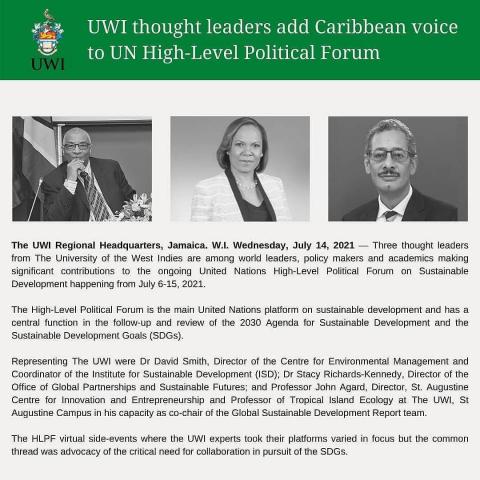UWI thought leaders add Caribbean voice to UN High-Level Political Forum

The UWI Regional Headquarters, Jamaica. W.I. Wednesday, July 14, 2021— Three thought leaders from The University of the West Indies (The UWI) are among world leaders, policy makers and academics making significant contributions to the ongoing United Nations High-Level Political Forum on Sustainable Development happening from July 6-15, 2021.
The High-Level Political Forum is the main United Nations platform on sustainable development and has a central function in the follow-up and review of the 2030 Agenda for Sustainable Development and the Sustainable Development Goals (SDGs).
Representing The UWI were Dr David Smith, Director of the Centre for Environmental Management and Coordinator of the Institute for Sustainable Development (ISD); Dr Stacy Richards-Kennedy, Director of the Office of Global Partnerships and Sustainable Futures; and Professor John Agard, Director, St. Augustine Centre for Innovation and Entrepreneurship and Professor of Tropical Island Ecology at The UWI, St Augustine Campus in his capacity as co-chair of the Global Sustainable Development Report team.
The HLPF virtual side-events where the UWI experts took their platforms varied in focus but the common thread was advocacy of the critical need for collaboration in pursuit of the SDGs.
Dr David Smith spoke at The SDG Learning, Training and Practice Special Event organised by United Nations Institute for Training and Research (UNITAR) and United Nations Department of Economics and Social Affairs (UNDESA). The event featured the University Network for Sustainable Development, a digital platform for knowledge sharing between Latin America and Caribbean universities. Commenting on the need to emphasise multidisciplinary, transdisciplinary and team approaches, Dr Smith said “To tackle and achieve the SDGs we have to adopt team approaches which is often a break from the way academia has worked in the past. We must share information, data and knowledge and most importantly, make it accessible to everybody.” While he lamented the fact that knowledge created in the developed nations was often difficult to access, even by universities in developing nations, he was hopeful that the University Network for Sustainable Development would facilitate the necessary access to knowledge.
On Tuesday July 6 and Wednesday July 7, Dr Stacy Richards-Kennedy served as a panellist for two HLPF side-events, Partnering to Educate the Ocean Science Leaders of the Future and Unleashing the Potential of the Blue Economy respectively. At both sessions Dr Richards-Kennedy highlighted The UWI’s activist work and continued commitment to partnering for advancing Ocean Science and the Blue Economy—both of which are of critical significance to the sustainable development of Caribbean Small Island Developing States (SIDS). Speaking at the July 6 side event co-sponsored by the United Nations Academic Impact and the University of Bergen, Dr Richards-Kennedy contributed, “Deep sea exploration as well as the equipment and instrumentation for rigorous ocean research are extremely costly. At the moment, our Caribbean countries are battling multiple crises; the climate crisis, the COVID-19 public health crisis and the financial crisis that has been exacerbated by the pandemic. We are at a critical juncture where we urgently need to come together as a global community, at the level of the governments, but also the UN system, multi-lateral development banks, international foundations, philanthropic foundations and of course, our global network of universities, so that we can provide tangible support for each other. If not, what we risk, is the unravelling of decades of progress and the derailing of the prospects of achieving the SDGs.”
The July 7 panel discussion provided an opportunity for reflections and recommendations in helping countries tap into the full potential of the Blue Economy to diversify their economies. Dr Richards-Kennedy reiterated the critical role of Universities, emphasising that “we cannot maximise the potential of the Blue Economy without healthy oceans and we cannot have healthy oceans without rigorous scientific research and innovation”. She also highlighted The UWI’s award winning Climate Action portal and the Global Institute for Climate Smart and Resilience Development’s research and knowledge management hub, both developed in partnership with the UNDP.
The Global Sustainable Development Report (GSDR) is a United Nations publication aimed to strengthen the science-policy interface at the HLPF on Sustainable Development. Led by an independent group of scientists appointed by the Secretary-General, the GSDR is meant to be an ‘assessment of assessments’ and so it is supported by contributions from a wide range of experts and stakeholders, bringing together diverse perspectives and disciplinary backgrounds. An implementation-oriented, global report it also brings together knowledge from different regions, countries, and local communities, across a range of disciplines.
Co-chair of the team of independent scientist preparing the 2023 Global Sustainable Development Report (GSDR), Professor John Agard provided an update of the team’s work at this first briefing of the member states. He outlined that the 2023 GSDR would build on the 2019 report and the levers identified; Governance, Economy and Finance, Individual and collective action and Science and Technology.
Matters under discussion by the team include the need for multi-actor governance interventions for transformative change. The method, Professor Agard noted, must be “integrative, adaptive and inform governance approaches including smart policy mixes applied especially at key leverage points.” These leverage points include embracing diverse versions of good quality of life; reducing total consumption and waste; shifting values; reducing inequalities; practicing justice and inclusion; internalising externalities; ensuring responsible technology, innovation and investments and promoting education and learning.
The 2021 UN HLPF concludes on July 15, 2021 following a 3-day ministerial meeting of the forum and the adoption of a ministerial declaration.
-END-







